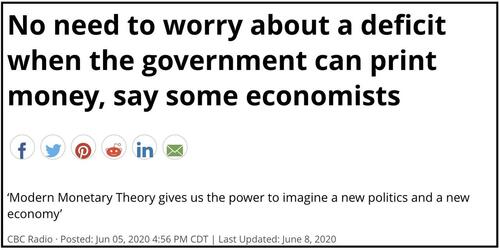 By Tyler Durden
By Tyler Durden
The mushroom cloud of central bank monetary destruction keeps growing, and is increasingly fueling discontent among workers whose standards of living are eroding along with the purchasing power of their wages.
Europe has already seen a wave of strikes aimed at securing inflation-offsetting pay raises. Now it’s Canada’s turn: At midnight, more than 155,000 Canadian federal government workers went on strike in what’s being described as the largest walkout against a single employer in the country’s history.
The strike was called by the Public Service Alliance of Canada (PSAC) union, which has been in negotiations for a new contract since 2021. This strike primarily encompasses two groups of federal employees: 120,000 at the Treasury Board and 35,000 at the Canada Revenue Agency (CRA).
Union reps for the Treasury Board employees have been asking for a 13.5% pay hike over three years. The CRA staffers want an immediate 9% raise and 20.5% over three years. The PSAC also wants the government to curtail contract work and make remote work more broadly and uniformly available.
The most hilarious PSAC demand? In what has to make many of its members groan with dread, the union is demanding more anti-racism training.
“We truly hoped we wouldn’t be forced to take strike action, but we’ve exhausted every other avenue to reach a fair contract,” said PSAC President Chris Aylward on Tuesday evening. The union has ordered members to show up at picket locations — or else be hit with union fines and the loss of strike pay and member privileges.
The strike makes for dicey politics for Prime Minister Justin Trudeau, whose government has increased the ranks of public employees by more than 33% since 2015. The labor-aligned New Democratic Party is a key backer of Trudeau’s ruling coalition, but disruption of services to Canadian citizens and markets is likely to fuel public ire.
At the same time, the strike also promises spillover effects across the Canadian economy, as it may inspire more strikes against private employers.
Since government workers are among the first to receive newly-created money — and thus, in accordance with the Cantillon effect, among the principal beneficiaries of central bank inflation — there’s something darkly amusing about seeing government staffers lead Canada’s rebellion against the ongoing loss of purchasing power.
The Ultimate Plan B Guide (Free Report)
Canada has more tax collectors than active army personal. tax collectors are going strike bcuz they want a 20% salary increase. Trudeau printed a bunch of money to hire more tax collectors which caused more inflation which the tax collectors want a salary increase to compensate😂
— NVK ⚡️🌞 nvk.org/nostr (@nvk) April 19, 2023
Though “idle federal employees” may sound like a redundancy, the strike promises to affect individual Canadians in a variety of ways, to include tax refunds and filing guidance ahead of the May 1 deadline, and slowed or halted processing of applications for passports and veterans benefits.
About 47,000 of the employees included in the strike are considered “essential” to the safety or security of the public, and will report to work. The union requirement for members to show up at picket locations raises a challenge for the legions of employees who were hired mid-pandemic, have always worked remotely — often from rural locations — and have no office to picket.
The walkout will involve two-thirds of the Canadian Grain Commission’s employees, and a majority of grain-export inspectors. Watch for a ripple in markets for wheat and canola — two of Canada’s principal agricultural exports.
While the Bank of Canada helped set the stage for the inflation-fueled strike, a spokesman told Bloomberg that the strike won’t materially affect its operations. That is to say, the money printer will keep going brrrr.

Source: ZeroHedge

Be the first to comment on "Massive Strike Hits Canada As Inflation Discontent Spreads Around The World"